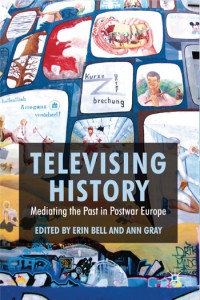Televising History
However, in the UK the past provides a large amount of content for more everyday TV history output. This part of our research has examined the rise and fall of history series, e.g. Secret History (Channel 4, 1991-2004) and Timewatch (BBC, 1981- ) the importance of scheduling, stripping and seasons in the presentation of history, and smaller scale programmes based on, for example, eyewitness testimony which continue to produce powerful and compelling television. As in other forms of programming, channel and network identities based on assumptions about the audience are important factors in considering what are appropriate genres and modes of address.
Some of the most heated debates both within the academy and in the broader public discourse have been about the employment of hybrids and formats and in particular ‘reality television’ techniques for the ‘re-enactment’ of the past. The huge success of Who Do You Think You Are? is evidence that difficult and traumatic histories, whether within living memory or more distant, can be offered to large audiences, albeit mediated via a well-known personality, whilst re-enactment series such as Edwardian Country House (Channel 4, 2002) and more recently Victorian and Edwardian Farm (BBC, 2009-10) offer insights into material conditions and certainly into the differences – social, physical and cultural – between a given era in the past and the present. In a number of ways the genres of ‘reality or lived history’ render some of the most interesting questions about the televising of the past across the range of our interests and provide a number of excellent case studies in understanding the operations of television.
Although the project has not looked directly at audiences, we have gathered a strong impression of how audiences are perceived by commissioners and producers; and how these perceptions and market imperatives shape the form and content of programmes to explore the decisions and the hunches behind conceptions of the audience; and how these become manifest through the programmes themselves.
In order to fully explore our question ‘how do we get the kind of television history we do?’, we have sought to problematise history in thinking about the absences or lack of attention to periods, people and approaches and asked our informants to comment on this. Social history, which used to be a mainstay of British television, can now be found mostly tucked away in episodes of Who Do You Think You Are? and there is still a profound lack of post-colonial histories and relatively little on black history and women’s history, or other members of non-elite groups. Of course television must be selective but as the main channel of information about the past for vast numbers of the population in the UK and elsewhere the relentless bias towards particular periods in history, especially the Tudors and World Wars, as well as the tendency towards a linear narrative, which presents history as a given needing no interpretation, and the increasing emphasis on celebrity and personal authorship, suggests that the logics of television are winning over other considerations, cultural, scholarly or ethical, involved in presenting the past.
Professor Ann Gray / Dr Erin Bell
University of Lincoln
http://tvhistory.lincoln.ac.uk/
 Learning on Screen
Learning on Screen
